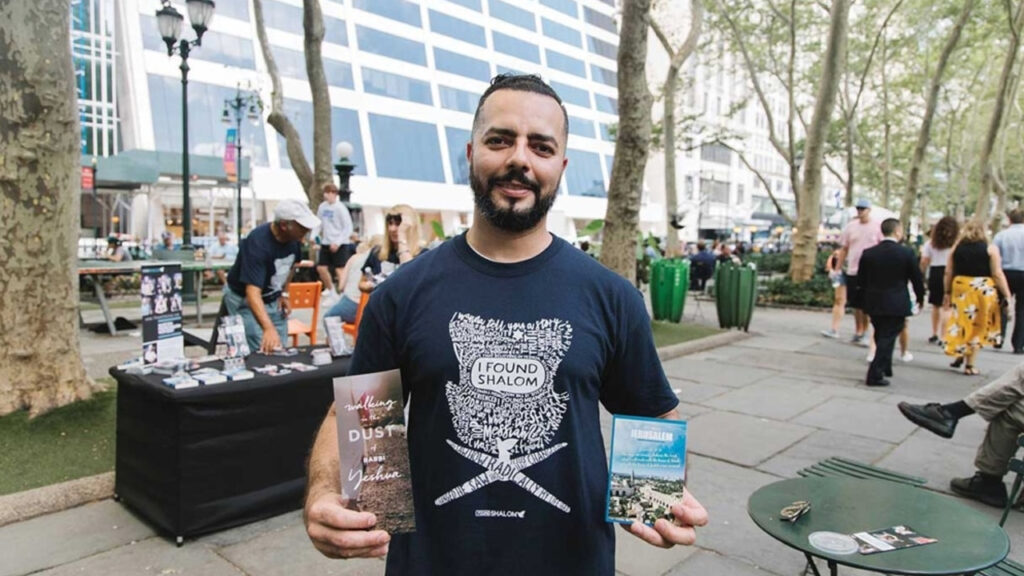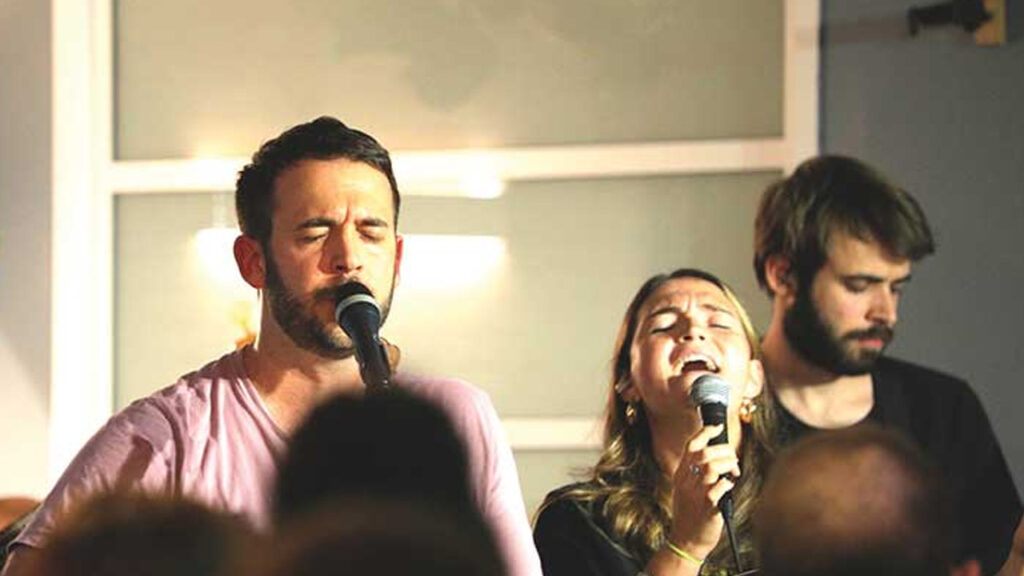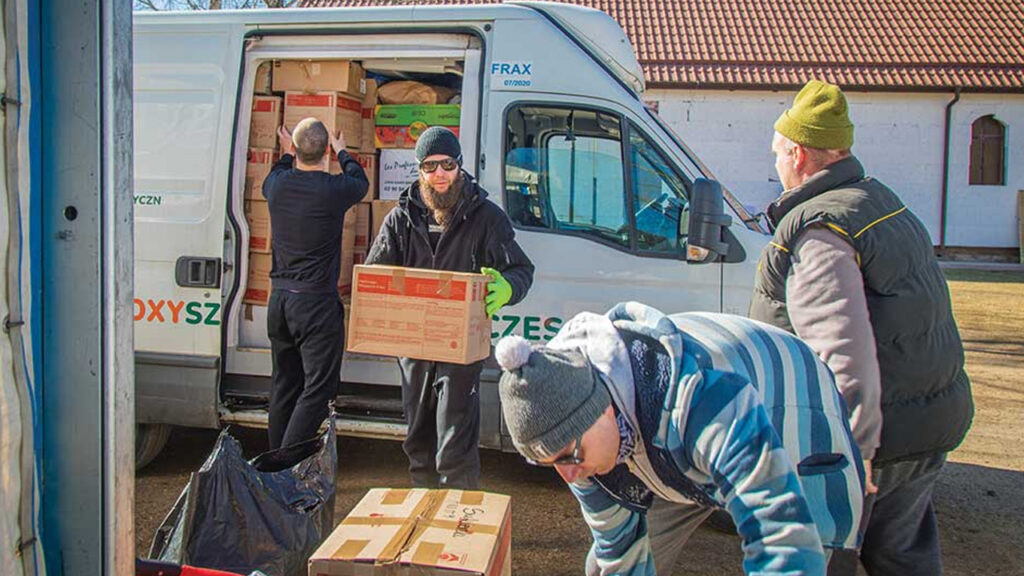Shalom and Happy Jewish New Year! According to the Jewish calendar, we are about to begin year 5785! Traditional Judaism teaches year zero marks the year of creation. Although most modern Jewish people might not accept this position, they still celebrate the holiday known as Rosh Hashanah, “the head of the year,” on the first two days of the Hebrew month known as Tishrei. The corresponding Gregorian date changes from year to year as the Gregorian calendar and Jewish calendar do not align. This year, Rosh Hashanah begins at sunset on Wednesday, October 2, and concludes at sunset on Friday, October 4.
If, for some reason, we wander off the path in our relationship with the Lord, the holiday of Rosh Hashanah teaches us there is always a way back into His presence (Revelation 2:4–5).
Repentance and Renewal for All
The way back is through repentance as illustrated by the waiting father who embraced his prodigal son (Luke 15:11–32). The Lord will take us back and continue to change us until the day we meet Him face to face, which is His promise and purpose in saving us from our sin! Paul writes,
For those whom He foreknew, He also predestined to become conformed to the image of His Son, so that He would be the firstborn among many brethren; and these whom He predestined, He also called; and these whom He called, He also justified; and these whom He justified, He also glorified. (Romans 8:29–30)
Rosh Hashanah in Jewish tradition is all about repentance. Now, we know repentance cannot save us. If so, then God would not have called upon His ancient people to offer blood sacrifices (Leviticus 17:11). Yet, if we confess our sins—agreeing with God about the lethal nature of our sin—and turn to Him, He will forgive us and cleanse us (1 John 1:9–10). Followers of Jesus can learn valuable lessons from this Jewish festival about the power of repentance. It is for all of us who love the Lord and want to grow in Him. How wonderful to have these holidays to remind us of the need to be regularly cleansed of our sins as we walk through this life.
We must remember in Jesus, everything is made new—or rather, renewed and restored to our God-intended purpose and glory. As Jewish people prepare to usher in the year 5785 on Rosh Hashanah, the gospel’s invitation to embrace a new life, a new heart, and, indeed, the New Covenant is as relevant as ever.
130 Years of Celebrating the Jewish High Holidays Fulfilled in Jesus the Messiah
Rosh Hashanah begins what is often called the “high holidays” or “high holy days” and is followed by Yom Kippur, the Day of Atonement. These holidays are “high” and “holy” because of the weightiness of their themes. On Yom Kippur, according to Jewish tradition, the fates of all Jewish souls are sealed for either blessings or curses for the upcoming year, and the measure used by God to seal their fate is the quality of one’s repentance, good deeds, and prayers.
Perhaps you can now understand why, 130 years ago, Rabbi Leopold Cohn discovered the incomparable new life Jesus offers by His atonement and became deeply burdened to proclaim this message among his fellow Jewish people. We honor his memory and celebrate 130 years of faithful service for the Lord through Chosen People Ministries this year.
Rabbi Leopold Cohn, the founder of Chosen People Ministries, emigrated from Hungary to New York City, where he heard the gospel preached in Yiddish, his mother tongue. After reading some of the New Testament, he came to faith in Jesus. When one tastes the free gift of the new and abundant life in Jesus for the first time—especially after having had to work hard for God’s blessing and favor every new year—he not only relishes the joy but hungers to tell others.
A passionate new believer, Cohn wrote about his meeting with Jewish members of his local community, “I showed them from the Scriptures that to believe in Yeshua [Jesus] was Jewish faith, real Jewish faith.” This was to become Leopold Cohn’s life calling and also a guiding principle for the ministry he soon founded in the Brownsville section of Brooklyn, New York, in 1894.
Chosen People Ministries—Then and Now
Cohn launched various forms of outreach based on both the spiritual and practical needs of his poor immigrant Jewish community. It included congregational meetings, benevolence ministry, English classes (where he would have Jewish people read the English New Testament), sewing classes, children’s camps, and Bible studies. Since the days of Cohn, the Lord has given growth and multiplied the fruit of Chosen People Ministries among Jewish people—everywhere!
Today, Chosen People Ministries is a global ministry located in twenty countries and twenty-six cities within the United States. Perhaps not even Cohn himself could have envisioned the extensive work we do today, especially in Israel and during the high holy day season.
Chosen People Ministries branches and congregations in the United States and around the globe enjoy visits from Jewish people at this time. Often, these Jewish people are brought to our services by their Gentile Christian friends. We use our holiday services as a way to renew our own faith and as prime opportunities to highlight the Jewishness of Jesus, who is the fulfillment of these high holidays. The fall festivals are a beautiful setting for the diamond who is Jesus. He shines so beautifully in His Jewish setting.



Jesus and the Jewish Holidays
But what exactly is Jesus’ relationship to these Jewish holidays, and, more importantly, how does He fulfill them? The festivals of Israel serve as a roadmap to redemption. They are, by nature, prophetic patterns unveiling God’s plan for a sinful and broken world in need of salvation.
The fall festivals found in Leviticus 23 highlight the themes of repentance on the Feast of Trumpets (Rosh Hashanah), redemption on the Day of Atonement (Yom Kippur), and rejoicing on the Feast of Tabernacles (Sukkot). Jesus has already fulfilled the spring festival of Passover because He died as the Lamb of God. Additionally, He fulfilled the Feast of First Fruits by His resurrection and Pentecost (Shavuot in Hebrew; Pentecost in Greek) with the giving of the Holy Spirit.
The fall festivals, though, await a future fulfillment. As the sound of a trumpet initiates the call to repentance on Rosh Hashanah (Lev 23:24), believers today still await the last trumpet blast announcing Jesus’ return. Moreover, this sound will serve as a national call leading all Israel into spiritual repentance, when they will behold Him “whom they have pierced and mourn for Him as one mourns for an only son” (Zechariah 12:10, cf. John 19:37). At last, they will accept Jesus’ high-priestly redemption, thus fulfilling the Day of Atonement, and as the apostle Paul prophesied in Romans 11:26, “All Israel will be saved.”
Finally, this national redemption will inaugurate the messianic age with the Feast of Tabernacles (Sukkot). King Jesus will sit on His throne, God will fully and completely dwell on the earth as envisioned in the book of Revelation, and all nations will come up to Jerusalem to partake in this festival’s great rejoicing (Zech 14:9).
Proclaiming New Life in the Messiah for 130 Years
In the meantime, what Jewish people today need for a new year of new life and new blessings—and what we have been proclaiming for 130 years—is the new heart of the New Covenant:
“But this is the covenant which I will make with the house of Israel after those days,” declares the Lord, “I will put My law within them and on their heart I will write it; and I will be their God, and they shall be My people . . . for I will forgive their iniquity, and their sin I will remember no more.” (Jeremiah 31:33–34)
Rabbi Leopold Cohn knew his fellow Jewish people needed to hear the Messiah had come and died for their sins. Under the Law, almost everything was purified with blood—especially in matters as grave as forgiveness and atonement—and every covenant was initiated with blood (Genesis 8: 20–22, 15:9–19; Exodus 12). According to Scripture, “without the shedding of blood there is no forgiveness” (Hebrews 9:22). Through the New Covenant, God promised to give Jewish people a new heart and the assurance of forgiveness of sins. We know these promises are for all who believe, both Jewish and Gentile, in the perfect Lamb of God who takes away the sins of the world through His sacrifice (John 1:29).
This month, we are celebrating 130 years of our ministry’s proclamation of the power of Jesus’ blood for salvation—“to the Jew first and also to the Greek” (Romans 1:16)! May the high holidays this year not only be rich in repentance but also covered in the blood, which brings new life.

- Table of contents
-
From Mitch's DeskBlow a Trumpet in Zion
-
ArticleNew Year – New Life in the Messiah!
-
ArticleA High Holiday Bible Study
-
President's LetterHope is Rising in Tel Aviv
-
-
-
-
Ministry News Briefs
Sign up to receive our email newsletters
Get the latest news from Israel, insights from Dr. Mitch Glaser, international ministry reports, as well as videos and podcasts, downloadable resources, discounts in our online store, and much more!
